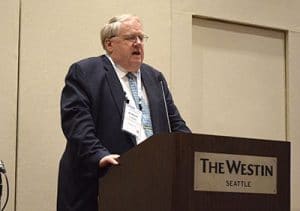The Federal Railroad Administration (FRA) will have some major shoes to fill with the April 13, 2019, retirement of Robert “Bob” Lauby, the agency’s chief safety officer.
Lauby had served in that capacity for FRA since September 2013. He was a frequent presenter at SMART Transportation Division regional meetings and worked to provide regulatory oversight for rail safety in the United States while overseeing the development and enforcement of safety regulations and programs related to the rail industry.
“Serving as the associate administrator for Railroad Safety and FRA’s chief safety officer is one of the highlights of my career,” Lauby said. “The job has been both challenging and fulfilling.
“Over the years, we grappled with many important issues and have significantly changed the industry for the better.”
Lauby had a hand in several regulatory safety efforts at FRA such as Positive Train Control, conductor certification, training requirements, drug and alcohol testing for maintenance of way employees, roadway worker protection, passenger equipment standards, system safety and others.
Other safety oversight improvements happened as a result of major accidents. Some of the major ones included crude-oil accidents at Lac Megantic, Ontario, Canada; Mount Carbon, W.Va.; and other locations; commuter train accidents at Spuyten Duyvil and Valhalla, N.Y.; and Amtrak passenger train accidents in Philadelphia and Chester, Pa.; Dupont, Wash.; and Cayce, S.C.
“No matter the challenges swirling around him, Bob had safety in mind,” said National Legislative Director John Risch. “He’s been great to work with and one of the most committed, level-headed professionals in the rail industry.”
Lauby said that he treasured any interaction he could have with members of rail labor as these helped to broaden his perspective about whom he was working to protect.
“I always took time to talk to the SMART TD membership to get their complaints, opinions, and perspectives on the latest industry issues,” Lauby said. “I often left enlightened or with a new perspective.
“Railroad managers are experts on what is supposed to happen. SMART TD members are experts on what actually happens. They always know what works and what does not work.”
In his more-than-40-year career, Lauby’s railroad and transit experience included safety, security, accident investigation, project management, project engineering, manufacturing and vehicle maintenance.
He joined the FRA in August 2009 as staff director of its newly established Passenger Rail Division in the agency’s Office of Safety and was later promoted to deputy associate administrator for regulatory and legislative operations at FRA. One of his responsibilities in that role was to oversee the Rail Safety Advisory Committee (RSAC).
Prior to his time at FRA, Lauby was director of the National Transportation Safety Board’s Office of Railroad Safety, overseeing hundreds of rail accident investigations for NTSB and coordinating with our union’s Transportation Safety Team in many investigations. He was NTSB’s representative on RSAC.
“At our regional meetings, I would introduce Bob and tell the troops that Bob was the big gun and can handle all the tough questions, which he always did,” Risch said at a party celebrating Lauby’s retirement in late March.
Lauby said he took his multiple presentations at TD regional meetings, including at the Seattle regional meeting last July, seriously — he felt he owed it to the attendees to give them useful information.
“I looked forward to the meetings each year and spent hours preparing my presentation and preparing for the questions I would get at the end – during the Q and A session,” he said. “I wanted the material I presented to be timely and useful to the membership, and I always tried to include the inside scoop – the stuff nobody else would talk about!”
But the benefits from his visits and interactions went both ways, he said, and showing up at the meetings gave him a fresh perspective on the industry.
“I always enjoyed speaking to the SMART TD membership – both at the Regional Meetings and when they were on their jobs,” Lauby said. “Whenever I traveled by train, I tried to spend time with the train crew or ride the head end to find out the issues of the day.
“I learned more about railroading from the working men and women of the railroad industry than from anyone else.”
Lauby’s departure is leaving a vacancy that FRA will have a difficult time filling, Risch said.
“No one will really fill your shoes because there is no one with the knowledge and experience to do that,” he told Lauby at his retirement party. “You committed your working life to rail safety, you have been a good friend of mine and a good friend to railroad workers everywhere.
“We wish you all the best as you enter this next stage of your life.”
Lauby said his career leaves him with a sense of gratitude.
“I will always be grateful to have had the opportunity to work in the industry I love, in a role where I felt I could make a difference,” Lauby said. “I will miss the thousands of people I interacted with each year. That includes the FRA employees and railroad industry labor and management … all the folks I dealt with at the various RSAC meetings. People are the most important part of any organization and the railroad industry is no different.”
Tag: Robert Lauby
A victory for safety was achieved in June when the Federal Railroad Administration’s (FRA) Railroad Safety Board denied a request by the Association of American Railroads (AAR) to lengthen the “off-air” restriction from four to 24 hours for required brake tests and inspections.
AAR had written to FRA in December 2017 seeking a petition for waiver, arguing that safety would not be affected and that lengthening the off-air restriction would bring U.S. requirements in line with Canada’s 24-hour off-air restriction.
However, SMART Transportation Division President John Previsich and union leaders from the Brotherhood of Locomotive Engineers and Trainmen (BLET), Brotherhood of Railroad Signalmen (BRS), American Train Dispatchers Association (ATDA) and Brotherhood Railway Carmen Division (TCU/IAM)’s letter in February urged FRA officials to deny the request.
The waiver would be unenforceable and too far-reaching, the unions argued.
“Despite the carriers’ safety assurances, the labor organizations have concerns with this far sweeping request for waiver given the fact that it will cover AAR’s entire membership,” the unions said. “To allow such a sweeping waiver request to go forward, each railroad would have to demonstrate that the cars on their railroad had state of the art brake valves, dryers and automatic moisture drainage. It is hard to imagine FRA granting such a ‘one size fits all’ waiver to each of AAR’s member railroads.”
The FRA board agreed with SMART TD and the other rail unions, with Robert Lauby, FRA Associate Administrator for Railroad Safety, saying in the agency’s June 19 denial letter that the petition was better considered as part of the rulemaking process.
The board also said that AAR failed to prove that the changes would not have an adverse effect on safety.
“Based on its review and analysis, the board concluded that granting the requested relief would not be in the public interest or consistent with rail safety,” Lauby wrote.
Lauby also said in the letter that the data provided by AAR to support its petition did not cover the variety of real-world conditions encountered while running trains.
“Absent more detailed data demonstrating that safety would not be compromised, the Board concluded that the waiver request was not justified,” Lauby said.
